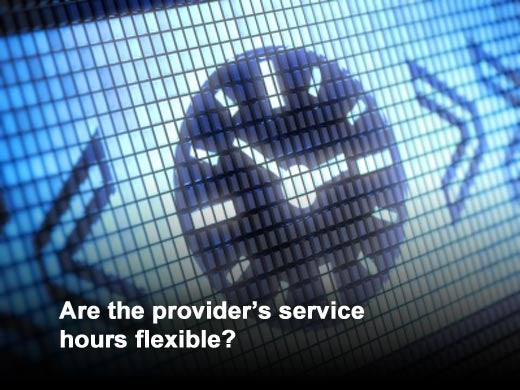The phrase “help desk” often brings to mind a remote technical support team assisting callers with computer application issues. But today’s help desk has undergone profound changes. Service desks today are based on Information Technology Infrastructure Library (ITIL) principles that direct providers to align their IT services with the needs of their clients’ businesses. As the service desk takes on a much broader role, serving as the central point of contact for all IT service-related activities, help desks have quickly become “the face of IT,” making it critical for IT pros to know what questions to ask when evaluating potential partners. To help, Logicalis, an international IT solutions and managed services provider, has identified six key questions CIOs should ask while shopping for an outsourced service desk solution.
“The time to pinpoint what’s important to your organization in a help desk partner is before the relationship begins,” says Tom Roberts, solution architect for Logicalis. “Outsourcing help desk functions should be a way for CIOs to increase their service levels and, many times, decrease their costs in the process. The key to choosing the right service desk partner is through an up-front investigation of their services and policies, and a drilling down into the way they conduct their business by knowing what questions are critical to ask.”
Click through for six questions CIOs should ask while shopping for an outsourced service desk solution.
Service desks are comprised of numerous support agents, all standing ready to answer calls on behalf of the provider’s clients. The shared resource model is what makes this cost effective. But it’s possible to have both a shared pool of resources and a dedicated support team. A provider that is willing to dedicate a core team to a client’s calls means those support agents become intimately experienced and expert in their primary customers’ businesses. Whenever possible, calls should only roll over to other agents when call volumes exceed the core team’s bandwidth.
Effective service desks must have detailed tracking and reporting capabilities; with these kinds of metrics, the service desk can identify patterns, helping the client become proactive in addressing recurring issues, instituting user trainings or inserting knowledge-based directives into a self-service portal. Identifying and addressing such patterns not only increases service levels, but it drives down the customer’s costs on a per-incident basis by reducing the number of calls that come into the service desk.
Most service desks today operate on a 24/7 schedule, but what if a client only needs to outsource service desk capabilities at night, on weekends or during some other custom set of hours? It’s important for clients to choose a provider whose service hours match their unique business requirements.
One of the most important questions to ask a prospective service desk partner is whether or not their service levels are tiered. Tier-1 support agents answer basic troubleshooting questions, while tier-2 answer more complex network-centric questions at a higher price point per incident. Clients can save money with a multi-tiered service desk offering by paying only for the level of expertise their callers require.
A true service desk should offer a single point of contact for all help desk questions the client organization might encounter. Even if the calls are not tech-related, a single point of contact centralizes a client’s inbound service calls to one source, then escalates non-IT calls to outside vendors or appropriate departments inside the client organization; tech calls can then be routed to the service provider’s tier-1 or tier-2 IT specialists.
Call volumes fluctuate. But experienced service desk providers can examine client call volumes, establishing baseline norms and determining the frequency of regular activity spikes. Comparing established norms to existing SLA requirements on a quarterly basis allows for intelligent projections and adjustments to be made that can benefit the client financially.









